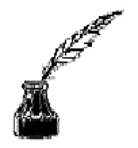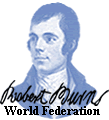 I'd
like to tell you about how the story of Wallace influenced and inspired
Robert Burns and I'll give you some examples from his poetry.
I'd
like to tell you about how the story of Wallace influenced and inspired
Robert Burns and I'll give you some examples from his poetry.
Between
the ages of 7 and 18 Burns lived and worked at Mount Oliphant, his father's
farm near Alloway. He was 15 when he wrote his first love poem, for
Nellie Kilpatrick. Nellie's father was a blacksmith and he lent Burns
"The History of Sir William Wallace," by Hamilton of Gilbertfield.
It was one of the first books he read other than his schoolbooks. He
said later that this book gave him more pleasure than anything else.
Of course, he meant compared to other books! The book was based on Blind
Harry's 15th century ballad "The Actis and Deidis of... Schir William
Wallace," but written in the more readable language of the 18th
century. Some years after reading this Burns wrote: "The story
of Wallace poured a Scottish prejudice in my veins, which will boil
along there til the floodgates of life shut in eternal rest."
The ballad
refers to Leglen Wood on the banks of the River Ayr, which was a regular
hiding place used by Wallace. From Hamilton of Gilbertfield's version
we learn that Wallace would go:
"Syne
to the Leglen wood, when it was late,
To make a silent and a safe retreat."
Burns'
father moved his family to Lochlie farm on the north bank of the River
Ayr near Tarbolton when Burns was 18. They stayed there until Burns
was 25 when his father died. Lochlie was near to Leglen wood. Burns
later described a visit he made there:
"I
chose a fine summer Sunday, the only day of the week in my power, and
walked half a dozen of miles to pay my respects to the "Leglen
Wood", with as much devout enthusiasm as ever pilgrim did to Loreto;
and as I explored every den and dell where I could suppose my heroic
Countryman to have sheltered, I recollect (for even then I was a Rhymer)
that my heart glowed with a wish to be able to make a Song on him, equal
to his merits."
There is
now a memorial cairn to Wallace and Burns at Leglen Wood on a mound
overlooking the River Ayr. And while I am mentioning memorials, the
enormous statue of Wallace at Dryburgh, by the River Tweed, which was
recently renovated, has a link with Burns. It was unveiled in 1814 by
the Earl of Buchan to whom Burns had sent a copy of "Scots Wha
Ha'e" some 20 years previously.
 Burns
wrote literally hundreds of letters in his lifetime. He particularly
enjoyed corresponding with Mrs Dunlop, an older lady whose father, Sir
Thomas Wallace of Craigie claimed descent from Sir Richard Wallace who
as Burns puts it "was a cousin to the great Sir William Wallace."
When Burns wrote to tell Mrs Frances Dunlop about his new-born son Francis
Wallace Burns, he said "…little Frank: '...who, by the bye,
I trust will be of no discredit to the honorable name of Wallace, as
he has a fine manly countenance, and a figure that might do credit to
a little fellow two months older; and likewise an excellent good temper,
though when he pleases he has a pipe, only not quite so loud as the
horn that his immortal namesake blew as a signal to take out the pin
of Stirling bridge'.
Burns
wrote literally hundreds of letters in his lifetime. He particularly
enjoyed corresponding with Mrs Dunlop, an older lady whose father, Sir
Thomas Wallace of Craigie claimed descent from Sir Richard Wallace who
as Burns puts it "was a cousin to the great Sir William Wallace."
When Burns wrote to tell Mrs Frances Dunlop about his new-born son Francis
Wallace Burns, he said "…little Frank: '...who, by the bye,
I trust will be of no discredit to the honorable name of Wallace, as
he has a fine manly countenance, and a figure that might do credit to
a little fellow two months older; and likewise an excellent good temper,
though when he pleases he has a pipe, only not quite so loud as the
horn that his immortal namesake blew as a signal to take out the pin
of Stirling bridge'.
But apart
from farming, letter writing and procreating, Burns also wrote poetry!
He described how this came about in the preface to the Kilmarnock edition:
"The
Poetic Genius of my country found me …at the plough and threw her
inspiring mantle over me. She bade me sing the loves, the joys, the
rural scenes and rural pleasures of my native soil, in my native tongue."
This theme
is developed in his poem "The Vision." Burns imagines a guardian
angel looking after Scotland - the Great Genius "Scotia" -
and under his command a band of specialist geniuses - Coila, Scotland's
national poetic genius whose job was to inspire rhyme, another to assist
farming, one for the weather, another to inspire patriotism, and so
on, The poem includes these lines: -
 My
heart did glowing transport feel
My
heart did glowing transport feel
To see a race heroic wheel
And brandish round the deep-dyed steel,
In sturdy blows;
While, back-recoiling, seem'd to reel
Their Suthron foes.
The next
verse starts with
His Country's
Saviour, mark him well…"
Lest he
be misunderstood, Burns explains in a footnote that "His Country's
Saviour" is "William Wallace." The poem also refers to
another cousin of Sir William, Adam Wallace of Richardton. His castle
was otherwise known as Riccarton Castle, or by its present name Kilmarnock
Fire Station! (There is a plaque on the wall which acknowledges this.)
Burns sent
poems to other Ayrshire poets, like Willie Simpson of Ochiltree with
the verses: -
 "We'll
sing auld Coila's plains and fells,
"We'll
sing auld Coila's plains and fells,
Her moors red-brown wi' heather bells,
Her banks an' braes, her dens an' dells,
Where glorious Wallace
Aft bure the gree, as story tells,
Frae Suthron billies.
At Wallace'
name what Scottish blood,
But boils up in a spring-tide flood!
Oft have our fearless fathers strode
By Wallace' side,
Still pressing onward, red-wat-shod,
Or glorious dy'd"
One of
the last songs Burns wrote was "Guid Wallace" which tells
how Wallace asked a lady, who was at a well with her washing, if she
could tell him any news. She pointed to a house where 15 Englishmen
were staying who were looking for him. Wallace disguised himself as
an old man and went to the house where the English captain offered him
15/- if he would lead them to Wallace. Wallace slew him on the spot
and dispatched the rest of them before they could get to their feet.
He went back to tell the lady at the well and she took him to meet her
husband and made him something to eat. But soon another 15 Englishmen
came looking for him. The lady's husband helped Wallace to fight them
off, defeating 10 of them at the door of the house. The other 5 ran
off to the woods but were caught and hanged from the trees. English
tourists weren't really welcome in those days!
Burns described
Wallace as "…the immortal Preserver of Scottish Independence."
So when Scottish Independence was given away in 1707 he was scathing
in his criticism of the members of the Scots Parliament. Many of them
had received financial inducements to secure their support for the Union
with England. They deserved Burns' immortal epithet: -
 "A
Parcel of Rogues in a Nation."
"A
Parcel of Rogues in a Nation."
"Oh
would, ere I had seen the day
That treason thus could sell us,
My auld grey heid had lain in clay
Wi' Bruce and loyal Wallace!
But pith
and power, till my last hour,
I'll mak this declaration;
We're bought and sold for English gold,
Such a parcel of rogues in a nation!"
Burns regretted
the loss of Scotland's political sovereignty but he also objected to
the Anglicisation of Scots culture. He addressed the audience before
a play at a theatre in Dumfries, challenging Scots authors to use our
own eventful history as the basis for playwriting, rather than leaving
us to thole English plays. He began: -
"What
needs this din about the town o' Lon'on?
How this new Play, or that new Sang is comin?"
He continues:
"Is
there no daring Bard will rise and tell
How glorious Wallace stood, how hapless fell?
Where are the muses fled, that should produce
A drama worthy of the name of Bruce?
How on this spot he first unsheath'd the sword
'Gainst mighty England and her guilty Lord,
And after many a bloody, deathless doing,
Wrench'd his dear country from the jaws of Ruin!"
The poem
carries on with references to Mary, Queen of Scots and Elizabeth, her
vengeful English cousin. Mary, Queen of Scots and Sir William Wallace
were both found guilty as traitors to the English Crown, to which neither
owed any allegiance. Burns' indignation about these two judicial murders
sets the background to his plea for his country's freedom:
"Thee,
Caledonia, thy wild heaths among,
Thee, famed for martial deed & sacred Song,
To thee I turn with swimming eyes;
Where is that soul of Freedom fled
Immingled with the mighty Dead,
Beneath that hallowed turf where WALLACE lies!"
And in
"The Cottar's Saturday Night" Burns wrote: -
 "O
Scotia! My dear, my native soil!
"O
Scotia! My dear, my native soil!
For whom my warmest wish to heaven is sent.
Long may thy hardy sons of rustic toil
Be blest with health and peace and sweet content
And O may heaven their simple lives prevent
From luxury's contagion, weak and vile
Then howe'er
crowns and coronets be rent
A virtuous populace may rise the while
And stand a wall of fire around their much-loved isle."
"O
Thou! Who poured the patriotic tide,
That stream'd through Wallace's undaunted heart;
Who dar'd to, nobly, stem tyrannic pride,
Or nobly die, the 2nd glorious part:
(The patriot's God, peculiarly thou art,
His friend, inspirer, guardian and reward!)
O never, never Scotia's realm desert,
But still the Patriot, and the Patriot-bard,
In bright succession raise, her Ornament and Guard!"
This Scottish
prejudice, which boiled along in Burns veins, is at its most impressive
in
"Scots Wha Hae," recalling how the nation had suffered with
Wallace, fighting against oppressive English rule, and then how under
Bruce the country had been steadily regained, castle by castle until
only Stirling remained under English control. The King of England had
brought his army to Scotland with its first objective being to relieve
the Stirling garrison. Burns said "Scots Wha Ha'e" was written
when "the accidental recollection of that glorious struggle for
Freedom, associated with the glowing ideas of some other struggles not
quite so ancient, roused my rhyming mania." In another letter he
wrote: "One favored hour of my Muse, I was reading the history
of the battle of Bannockburn, & figuring to myself the looks &
feelings of the Scots Patriot Heroes on that eventful day, as they saw
their hated but powerful Tyrants advance. -The following, I have called,
Bruce's Speech to his troops."
When Bruce
addressed his troops before they advanced down the hill in the fading
darkness early on that summer morning of 24th June 1314, his speech
would undoubtedly have included the sentiments expressed by Burns: -
"Scots
wha ha'e wi' Wallace bled,
Scots wham Bruce has aften led,
Welcome to your gory bed,
Or to victorie.
Now's the day and now's the hour;
See the front of battle lour;
See approach proud Edward's power,
Chains and slavery.
Wha will
be a traitor knave?
Wha wad fill a coward's grave?
Wha sae base as be a slave?
Let him turn and flee:
Wha for Scotland's king and law,
Freedom's sword will strongly draw,
Freeman stand or freeman fa',
Let him follow me.
By Oppression's
woes and pains!
By your sons in servile chains!
We will drain our dearest veins,
But they shall be free
Lay the proud usurper low!
Tyrants fall in ev'ry foe!
Liberty's in ev'ry blow!
Let us do or die!!!
Wallace
inspired the Scots of his day to follow his leadership. His memory has
lived on and has motivated many generations of Scots, both before and
after Robert Burns. Burns' poetic genius captures the spirit of Wallace
and will ensure that both of them will be remembered as Scots Patriots
for many generations to come.
David Brown





